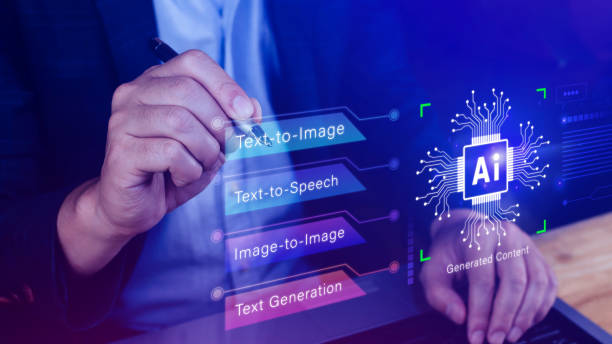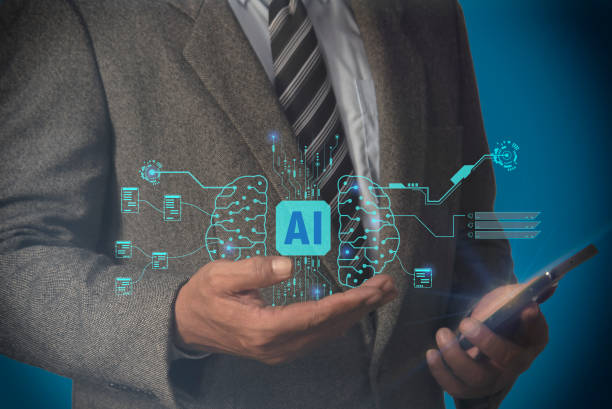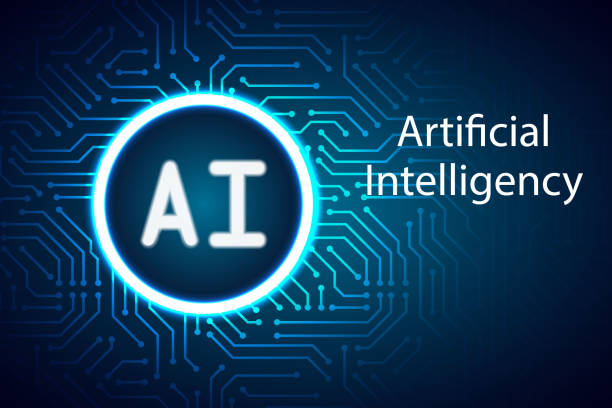What is Artificial Intelligence? Definitions and Basic Concepts

#Artificial_Intelligence (AI) is a branch of computer science that deals with building machines and systems capable of performing tasks that typically require human intelligence. These tasks include learning, reasoning, problem-solving, understanding natural language, and pattern recognition. Artificial intelligence is not merely imitating human behaviors, but rather creating systems that can make decisions and solve problems independently using algorithms and data. Artificial intelligence aims to simulate human cognitive abilities in machines.
Key concepts in artificial intelligence include machine learning, neural networks, natural language processing (NLP), and computer vision. Machine learning allows machines to learn from data without being explicitly programmed. Neural networks are computational models designed based on the structure of the human brain and are used for pattern recognition and deep learning. Natural language processing allows machines to understand and generate human language. Computer vision allows machines to understand and interpret images and videos. This complex interaction between these concepts increases the potential of artificial intelligence to solve complex problems and improve human lives.
Does your current website convert visitors into customers or drive them away? Solve this problem forever with professional corporate website design by Rasaweb!
✅ Create a powerful brand and credibility
✅ Attract target customers and increase sales
⚡ Get a free consultation now!
History and Evolution of Artificial Intelligence
![]()
The roots of artificial intelligence date back to the 1950s when researchers began exploring the possibility of building machines that could think. Alan Turing, a British mathematician and computer scientist, provided a framework for evaluating the intelligence of machines by presenting the Turing test. In the early decades, the focus was on solving specific problems and computer games.
In the 1980s and 1990s, with the advancement of hardware and software, we witnessed the emergence of expert systems and machine learning. Expert systems were computer programs that contained specialized knowledge in a specific field and could help experts in decision-making. However, these systems had limitations and could not automatically update their knowledge. Machine learning, using algorithms and data, allows machines to learn from their experiences without the need for explicit programming. This approach paved the way for the development of smarter and more flexible systems.
Types of Artificial Intelligence from the Perspective of Ability and Functionality

Artificial intelligence can be divided into different types based on ability and functionality. In terms of ability, there are two main types: weak artificial intelligence (ANI) and strong artificial intelligence (AGI). Weak artificial intelligence refers to systems designed to perform specific tasks and are limited in the same field, such as a chess program or a facial recognition system. Strong artificial intelligence refers to systems that are capable of understanding, learning, and performing any task that a human can perform. This type of artificial intelligence is still under development and has not been fully achieved.
In terms of functionality, artificial intelligence can be divided into four categories: reactive systems, systems with limited memory, systems aware of the theory of mind, and self-aware systems. Reactive systems, such as Deep Blue (IBM chess program), only react to current inputs and have no memory of past experiences. Systems with limited memory, such as self-driving cars, can store past information for a short time and use it to make decisions. Systems aware of the theory of mind can understand the mental states of others (such as beliefs and desires) and behave accordingly. Self-aware systems are self-conscious and can think about themselves. The development of self-aware artificial intelligence remains a major challenge in this field.
| Type of Artificial Intelligence | Description | Example |
|---|---|---|
| Weak Artificial Intelligence (ANI) | Designed to perform specific tasks with limitations in the same field | Chess program, facial recognition system |
| Strong Artificial Intelligence (AGI) | Capable of understanding, learning, and performing any task that a human can | Still under development |
Extensive Applications of Artificial Intelligence in Various Industries

Artificial intelligence is currently used in various industries and has created significant transformations. In the field of healthcare, artificial intelligence is used for diagnosing diseases, developing drugs, and improving patient care. Intelligent systems can analyze medical images and detect abnormalities with greater accuracy. In the automotive industry, self-driving cars, using artificial intelligence, are capable of driving without human intervention. This technology increases the safety and efficiency of transportation.
In the financial field, artificial intelligence is used for fraud detection, risk management, and providing financial advisory services. Machine learning algorithms can identify suspicious patterns in financial transactions and prevent financial crimes. In the retail industry, artificial intelligence is used to personalize the customer shopping experience, predict demand, and optimize the supply chain. Recommendation systems can suggest products and services to customers that are likely to be of interest to them. In the field of education, artificial intelligence can be used to personalize education, provide feedback to students, and automate administrative tasks. These applications demonstrate the potential of artificial intelligence to improve the quality of life and increase productivity in various industries.
Tired of losing customers due to poor e-commerce website design? With Rasaweb, solve this problem forever!
✅ Increase sales and visitor-to-customer conversion rates
✅ Smooth and attractive user experience for your customers⚡ Get a free consultation
Machine Learning and its Role in the Advancement of Artificial Intelligence

Machine Learning is one of the main sub-branches of artificial intelligence that allows machines to learn from data without being explicitly programmed. In machine learning, algorithms identify patterns and relationships using training data and, based on that, make predictions and decisions. Machine learning plays a very important role in the advancement of artificial intelligence and allows for the development of smarter and more flexible systems.
There are different types of machine learning algorithms, including supervised learning, unsupervised learning, and reinforcement learning. In supervised learning, the algorithm is trained using labeled data. Labeled data includes inputs and expected outputs. The algorithm tries to learn a function that maps inputs to expected outputs. In unsupervised learning, the algorithm is trained using unlabeled data. The algorithm tries to discover hidden patterns and structures in the data. In reinforcement learning, the algorithm learns how to maximize a specific goal by interacting with an environment. The algorithm learns which actions lead to the best result by receiving rewards or penalties for its actions.
Neural Networks and Deep Learning Architecture and Applications

Neural Networks are computational models designed based on the structure of the human brain. These networks consist of a large number of processing units called neurons, which are connected to each other in layers. Each neuron receives its inputs from the neurons of the previous layer, applies an activation function to it, and sends the result to the neurons of the next layer. Neural networks are a powerful tool for learning complex patterns and relationships in data.
Deep Learning is a sub-branch of machine learning that uses deep neural networks (neural networks with many layers) for learning. Deep neural networks are capable of learning complex and abstract features from data and have shown very good performance in various fields such as image recognition, natural language processing, and speech recognition. The architecture of deep neural networks includes different layers, each layer extracting specific features from the data. For example, in a deep neural network for image recognition, the early layers may extract simple features such as edges and corners, while the later layers may extract more complex features such as objects and scenes.
Challenges and Limitations of Artificial Intelligence

Despite remarkable advances, artificial intelligence still faces challenges and limitations. One of the main challenges is the need for large and high-quality data to train machine learning algorithms. Algorithms need a large amount of training data to learn patterns and relationships in the data. If the training data is incomplete, inaccurate, or biased, the algorithm may perform poorly.
Another challenge is the interpretability of artificial intelligence models. Many machine learning models, especially deep neural networks, are black boxes that are difficult to understand how they make decisions. This reduces trust in these models and limits the ability to detect and fix errors. There are also ethical issues related to the use of artificial intelligence. For example, the use of artificial intelligence in facial recognition systems may lead to a violation of people’s privacy. The use of biased algorithms in decision-making systems may lead to discrimination.
| Challenge | Description |
|---|---|
| Need for large and high-quality data | Machine learning algorithms need a large amount of data to learn patterns |
| Interpretability of models | It is difficult to understand how machine learning models make decisions |
| Ethical issues | The use of artificial intelligence may lead to violations of privacy and discrimination |
Social and Economic Impacts of Artificial Intelligence

Artificial intelligence will have profound impacts on societies and economies. On the one hand, artificial intelligence can lead to increased productivity, reduced costs, and the creation of new opportunities. Automating repetitive and tedious tasks can allow people to focus on more creative and strategic tasks. On the other hand, artificial intelligence can lead to job losses, increased inequality, and security concerns. Automation may cause some jobs to become obsolete and people need to learn new skills.
To reduce the negative impacts of artificial intelligence, appropriate policies need to be made. Governments should increase investment in education so that people can acquire the skills needed to work in the world of the future. Also, strong social safety nets should be created to support people who lose their jobs. In addition, laws and regulations should be enacted to ensure the responsible and ethical use of artificial intelligence. This requires cooperation between governments, industry, and civil society.
Dissatisfied with the low rate of converting visitors to customers on your e-commerce site?
Solve this problem forever with professional e-commerce website design by Rasaweb!
✅ Increase visitor-to-customer conversion rates
✅ Create a great user experience and build customer trust
⚡ Get a free consultation
Future of Artificial Intelligence Upcoming Trends and Perspectives

The future of artificial intelligence is very bright and promising. With rapid advances in hardware and software, artificial intelligence is expected to become increasingly powerful and pervasive in the years to come. Upcoming trends in artificial intelligence include the development of strong artificial intelligence, improving the interpretability of models, and increasing the application of artificial intelligence in new fields.
Strong artificial intelligence (AGI) refers to systems that are capable of understanding, learning, and performing any task that a human can perform. The development of strong artificial intelligence is a major challenge in this field, but it can create enormous transformations in human life. Improving the interpretability of models means creating models that are easier to understand how they make decisions. This increases trust in these models and allows for the detection and correction of errors. Increasing the application of artificial intelligence in new fields means using artificial intelligence to solve problems and improve life in areas where it has not been used before. These areas include agriculture, energy, and transportation.
How to Get Started with Artificial Intelligence Learning Resources and Tools

If you are interested in learning artificial intelligence, there are many resources and tools available to you. You can increase your knowledge and skills in this field by participating in online courses, reading books and articles, and using coding tools.
Some popular online courses in artificial intelligence include courses on Coursera, edX, and Udacity. These courses cover various topics including machine learning, neural networks, and natural language processing. Some useful books in the field of artificial intelligence include “Artificial Intelligence A Modern Approach” and “Deep Learning”. These books explain the basic and advanced concepts of artificial intelligence comprehensively. Some popular coding tools for artificial intelligence include Python, TensorFlow, and PyTorch. These tools allow you to develop and test artificial intelligence models. By using these resources and tools, you can start your journey in the world of artificial intelligence and become an expert in this field. Starting early is the key to success in this field.
Frequently Asked Questions
| Question | Answer |
|---|---|
| What is Artificial Intelligence? | It is the simulation of human intelligence in machines that are programmed to think like humans and mimic their actions. |
| What are the main branches of Artificial Intelligence? | They include machine learning, deep learning, natural language processing, computer vision, and robotics. |
| What is Machine Learning? | It is a branch of AI that focuses on enabling systems to learn from data and identify patterns without explicit programming. |
| Give examples of AI applications in our daily lives. | Voice assistants (like Siri and Alexa), recommendation systems on Netflix and Amazon, self-driving cars, and facial recognition programs. |
| What is Deep Learning? | It is a subset of machine learning that uses multiple-layer (deep) artificial neural networks to process large amounts of data. |
| What is Natural Language Processing (NLP)? | It is a branch of AI that focuses on enabling computers to understand, interpret, and generate human language. |
| What are some of the ethical concerns related to AI? | They include data bias, privacy, job loss, and liability in case of errors. |
| What are the main benefits of AI? | Increased efficiency, improved decision-making, automation of repetitive tasks, and discovery of complex patterns in data. |
| How is AI used in the field of healthcare? | In diagnosing diseases, discovering drugs, analyzing medical images, and providing personalized care for patients. |
| How do you see the future of AI? | It is expected to continue to evolve at a rapid pace, affecting all aspects of human life, from industry to education and entertainment. |
And other services of Rasa Web advertising agency in the field of advertising
Intelligent link building: designed for businesses looking to manage campaigns through the use of real data.
Intelligent link building: professional optimization to attract customers using key page optimization.
Intelligent website development: a creative platform to improve sales growth with custom programming.
Intelligent website development: professional optimization to increase website traffic using user experience customization.
Intelligent link building: a new service to increase campaign management through marketing automation.
And more than hundreds of other services in the field of internet advertising, advertising consulting and organizational solutions
Internet advertising | Advertising strategy | Advertisement report
Resources
What is artificial intelligence? Concepts and applications of artificial intelligence
,Artificial intelligence report with win-win approaches
,What is artificial intelligence (AI)?
,The application of artificial intelligence in our lives
? For a big leap in the digital world and to reach the peak of success, Rasaweb Digital Marketing Agency, with its comprehensive services including multilingual website design, professional SEO, social media management and targeted advertising campaigns, paves the way for the growth of your business.
📍 Tehran, Mirdamad Street, next to the Central Bank, Kazerun Jonoubi Alley, Ramin Alley No. 6
“`




